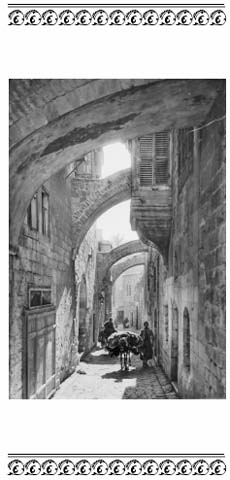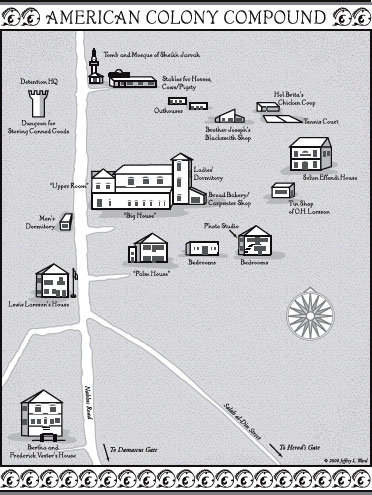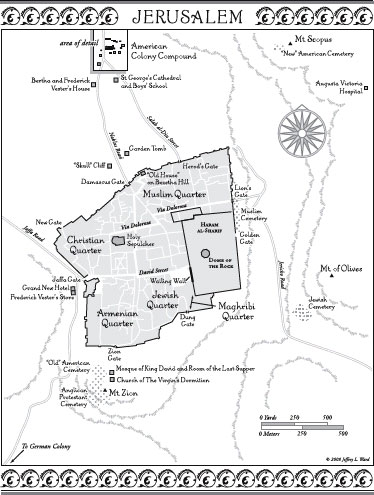


Contents
This book is dedicated to the youngest generation,
my three grandchildren:
Joe, named for the wonderful Joes;
Rob, for the special grandfathers;
and Julia, for her great-great-grandmother and her aunt.
As they decide the future, may they also study the past.
Praise, therefore, be to Him who hath made the histories of the Past an admonition unto the Present.
Sir Richard Burton, The Arabian Nights
Principal Characters
Chicago Overcomers
Anna and Horatio Spafford, and their daughters Bertha and Grace
Cousin Rob Lawrence, Horatios nephew
Aunt Maggie Lee, Horatios sister
Amelia Gould, Annas rich friend, recently widowed
William Rudy, mill owner
Caroline Merriman, Rudys foster mother
John and Mary Whiting, and their daughter Ruth. Their son John was born in Jerusalem, and the children would soon receive a substantial inheritance
Otis and Lizzie Page, and their daughter, Flora
Captain William and Mary Sylvester, who joined the group in London
Annie Aiken, the Spafford baby nurse, although only fourteen years old herself
Dr. Samuel Hedges, who did not sail with the group to Jerusalem
Members Who Joined the American Colony in Jerusalem
Elias Habib, Arab dragoman
Johanna Brooke, teacher
Jacob Eliahu, adopted by the Spaffords
Rev. Herbert Drake, companion of Chinese Gordon, and Annas tempter
Elijah Meyers, inventor, who recorded Annas messages
Rev. Edward F. Baldwin, former missionary to Morocco
Furman Baldwin, who attempted suicide over Grace Spafford
Professor John Dinsmore, educator; his wife, Mary; and their daughter, Ruth
Principal Swedes from Chicago and Ns
Olof Henrik Larsson, founder of Chicagos Swedish Evangelical Church; his wife, Mathilda; and their daughter, Edith
Olaf, Lars, Nils, and Eric Lind, brothers orphaned when their parents died in Jerusalem
Lewis Larsson, who married Edith, daughter of Olof Henrik Larsson
Jerusalem Friends of the American Colony
Rolla Floyd, tour operator, and his wife, Docia
Ali Bey Juzdar, the Overcomers landlord
Eliezer Ben-Yehuda, Hebrew scholar
Ismail Bey Husseini, director of public education, Jerusalem
Frederick Vester, who married Bertha Spafford
Principal Diplomatic Antagonists
U.S. Consul Selah Merrill
U.S. Consul Edwin S. Wallace
U.S. Consul General Charles M. Dickinson
Other Antagonists
Rev. A. Hastings Kelk, London Jews Society
P. H. Winterstein, correspondent for Our Rest and Signs of the Times
Alice E. Davis, correspondent for the Age to Come
T. J. Alley, printer of the defamatory tract The Spaffordite Fraud
John and Amelia Adamson, former members who escaped
Regina Lingle, Mary Whitings mother
Professor David Lingle, Mary Whitings brother
John S. Gould, Amelia Goulds brother-in-law in charge of her estate
Rev. William K. Eddy, Presbyterian Board of Missions
Evangelists
Dwight L. Moody, leading evangelist
Ira Sankey, Moodys singing partner
Major D. W. Whittle, whose daughter married Moodys son
William E. Blackstone, author of the Blackstone Memorial
Influential Millennialists in Great Britain
John Nelson Darby, founder of the Plymouth Brethren
Lord Shaftesbury, reformer
Dr. Charles Piazza Smith, astronomer royal


CHAPTER ONE
A Beginning
The world to an end shall come
In eighteen hundred and eighty-one.
Prophecy by an anonymous author, 1488
 O n a windy September day in 1881, the captain ordered the anchor dropped while the ship was still far offshore. This was routine procedure, as the port of Jaffa in Palestine was notoriously unsafe. Until that moment, however, not one of the eighteen pilgrims assembled on deck had been aware of just how difficult disembarkation might be. In their haste to leave Chicago, none had thought to pack a guidebook, and they now strained to make out details of the scene before them. The town of Jaffa seemed pretty in the morning sunlight. A mosque crowned a picturesque riot of domed houses tumbling down to the sea. There was an inviting waterfront, lined with handsome brick and stone warehouses, and orange trees abounded in the countryside around the town. But the foaming waves that crashed against a circular belt of sunken boulders between them and the shore were distinctly intimidating.1
O n a windy September day in 1881, the captain ordered the anchor dropped while the ship was still far offshore. This was routine procedure, as the port of Jaffa in Palestine was notoriously unsafe. Until that moment, however, not one of the eighteen pilgrims assembled on deck had been aware of just how difficult disembarkation might be. In their haste to leave Chicago, none had thought to pack a guidebook, and they now strained to make out details of the scene before them. The town of Jaffa seemed pretty in the morning sunlight. A mosque crowned a picturesque riot of domed houses tumbling down to the sea. There was an inviting waterfront, lined with handsome brick and stone warehouses, and orange trees abounded in the countryside around the town. But the foaming waves that crashed against a circular belt of sunken boulders between them and the shore were distinctly intimidating.1
Neither their own steamer nor any of the other large ships anchored nearby could get close to shore. This had been so since 1345, when the Egyptian Mamluks had destroyed Jaffas venerable harbor, determined that no infidel crusaders would ever again invade the Eastern lands after Sultan Baybars had expelled the last Western knights in 1271. Tradition had it that Andromeda was chained to one of these jagged rocks, and it was from Jaffaor ancient Joppathat Jonah had fled to escape being sent to Nineveh, and then was swallowed by a whale. Hiram of Tyre sent his Lebanese cedars on floats to this port for Solomon to build his great temple in Jerusalem, and in the town itself Simon the tanner had been host to Saint Peter.
The pilgrims knew these stories. Though they lacked a guidebook, they each carried a Bible, and biblical names and characters were as familiar to them as those of their families. They were both weary and excited. They had been voyaging since August 17, when they left Chicago abruptly, after nightfall. If some had not been completely ready, none could have hesitated. The glorious message for which they had been waiting had come at last. Eagerly, they obeyed the summons. The Resurrection was at hand and they were prepared to meet the Messiah.
Thus, via Quebec by train, then by steamer to London, six women, four men, a nineteen-year-old youth, two young girls, and three babies had sailed by the northern route to Liverpool. With the addition of a retired British army captain and his wife who had asked to join them in London, the little band was now close to their hearts desire. Soon they would be in Jerusalem to greet their Savior personally when He alighted on the Mount of Olives.
Within moments, a motley fleet of rowboats and little barges surging through the rock barrier threw their lines over the ships side and were bobbing against its hull. A rabble of barefooted Arabs, hoisting themselves up with ropes and chains, clambered swiftly aboard, shouting incomprehensibly. Many had daggers thrust into their wide red sashes, and all seemed enormous and frightening to the startled passengers whom the captain had only recently warned of Jaffas famously unceremonious custom of disembarkation. Clad in baggy trousers and wearing red fezzes, the boatmen fell upon passengers and baggage like a swarm of hornets, scooping men, women, children, trunks, valises, and hatboxes up in a viselike grip, and half-tossed, half-handed them over to their waiting comrades below. Finding themselves breathless and disarranged but at least safe in the heaving tenders, the ladies patted their bonnets and skirts back into order while the gentlemen offered a steadying hand. Once past the rock barrier, they were again seized by the Arab longshoremen, who carried them through the surf and up the beach, and finally set them down on Canaans sacred soil.
Next page










 O n a windy September day in 1881, the captain ordered the anchor dropped while the ship was still far offshore. This was routine procedure, as the port of Jaffa in Palestine was notoriously unsafe. Until that moment, however, not one of the eighteen pilgrims assembled on deck had been aware of just how difficult disembarkation might be. In their haste to leave Chicago, none had thought to pack a guidebook, and they now strained to make out details of the scene before them. The town of Jaffa seemed pretty in the morning sunlight. A mosque crowned a picturesque riot of domed houses tumbling down to the sea. There was an inviting waterfront, lined with handsome brick and stone warehouses, and orange trees abounded in the countryside around the town. But the foaming waves that crashed against a circular belt of sunken boulders between them and the shore were distinctly intimidating.1
O n a windy September day in 1881, the captain ordered the anchor dropped while the ship was still far offshore. This was routine procedure, as the port of Jaffa in Palestine was notoriously unsafe. Until that moment, however, not one of the eighteen pilgrims assembled on deck had been aware of just how difficult disembarkation might be. In their haste to leave Chicago, none had thought to pack a guidebook, and they now strained to make out details of the scene before them. The town of Jaffa seemed pretty in the morning sunlight. A mosque crowned a picturesque riot of domed houses tumbling down to the sea. There was an inviting waterfront, lined with handsome brick and stone warehouses, and orange trees abounded in the countryside around the town. But the foaming waves that crashed against a circular belt of sunken boulders between them and the shore were distinctly intimidating.1